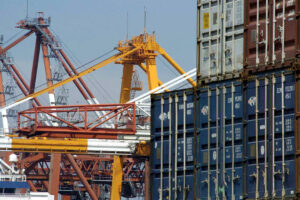THE imposition of taxes on freight and services rendered overseas could potentially push investors away from the Philippines, a global logistics company said.
At the German-Philippine Chamber of Commerce and Industry Forum on Tuesday, Michael Kurt Raeuber, chairman and group chief executive officer of Royal Cargo, said companies have concerns about the recent changes in tax rules.
“There’s one direction that would actually put a tax on freight. This is something China has tried unsuccessfully. They gave it up after a few months because the transactions on freight did not then happen anywhere in China but abroad,” he said.
“The other one is … based on the recent change in regulations (involving) the withholding 25% plus value-added tax (VAT) of 12% from the income of these people working for us abroad,” he added.
He said that the Philippines should not impose taxes on freight, as the Philippine law clearly states that taxes should be collected on income and not costs.
“Freight except for shipping lines is a cost for everybody else. And if you impose a cost on freight plus VAT, then you have an increase in the cost of freight of about 35%,” he said.
“This is hurting the Philippine economy … because if you have a tax on freight here, what happens is that the freight discussions and contracts will not be made in the Philippines but abroad,” he added.
On the new VAT rules for cross-border services, he said income of the Filipinos and foreigners they hire overseas will be subject to 25% withholding tax plus VAT.
“Our company is not only active in the Philippines but in many locations. We have people working for us abroad, but we pay them here in the Philippines,” he said.
“Now these are people that we are sending abroad to represent us, and what will happen there in the future if we have to renew a contract or sign a new contract about people working for us abroad? Definitely the contract will not be in the Philippines but in other countries,” he added.
He said that the Joint Foreign Chambers (JFC) recently sent a letter to the Department of Finance seeking the review of Administrative Order (AO) No. 23-2024.
Issued in May, the AO implements a digital system for the pre-border technical verification and cross-border electronic invoicing of all imported commodities.
“We recognize and appreciate the initiative’s intent to enhance national security, protect consumer rights, and safeguard the environment by ensuring that imported goods meet safety and quality requirements,” the letter said.
“However, we would like to emphasize the importance of aligning with international commitments and best practices, particularly under the World Customs Organization’s Revised Kyoto Convention, which advocates for simplified, predictable, and transparent customs procedures,” it added.
The JFC said that the AO is also non-compliant with the World Trade Organization’s Facilitation Agreement, which states that members shall not require pre-shipment inspections as it may inadvertently facilitate entry of unauthorized goods.
The group also said that the system will involve additional logistics costs and an additional timeline for the movement of goods.
“For multinational companies with regional operations, this will make the country less competitive as a manufacturing hub due to substantial logistics costs,” the letter read.
“Moreover, transportation and logistics expenses will be factored into the selling prices of goods, likely leading to higher domestic prices of commodities,” it added.
The letter was signed by the American Chamber of Commerce of the Philippines, Inc., Canadian Chamber of Commerce of the Philippines, Inc., European Chamber of Commerce of the Philippines, and Japanese Chamber of Commerce and Industry of the Philippines, Inc.
The other signatories also include the Korean Chamber of Commerce of the Philippines, Inc., Philippine Association of Multinational Companies Regional Headquarters, Inc. US-ASEAN Business Council, and EU-ASEAN Business Council. — Justine Irish D. Tabile

